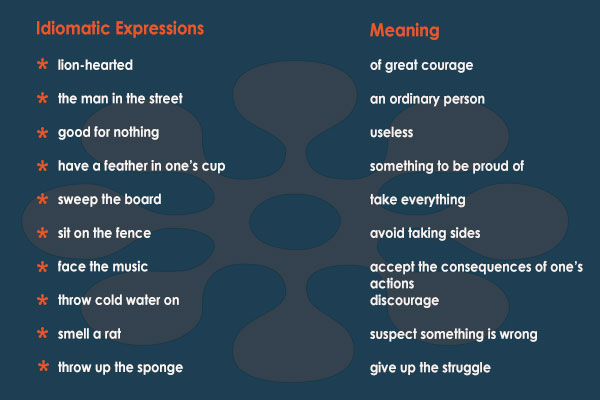

When learning idioms in English, you need to watch out for old-fashioned expressions. Something that is very ordinary or basic, nothing specialĭespite the excellent reviews, we thought the restaurant was just bog-standard. To make the salad dressing, you just put oil, vinegar, honey and mustard into a bowl, mix them together and bob’s your uncle! 17. To say that a set of instructions or task is simple or easy To do something that helps you get rid of stress, energy or angerĪfter my meeting with the boss, I went for a run to blow off steam. You’re going to have to bite the bullet and tell your ex-(girlfriend) that you need the apartment back. To decide to do something that is difficult or unpleasant, but necessary

Person B: “Sounds like a lot of work! Don’t bite off more than you can chew.” 14. Person A: “I’m going to start that weekend job at the museum on top of my full-time job because I really need the money.” To do too much or take something on that is too difficult Person B: “Sounds like you’re caught between a rock and a hard place.” 13. Person A: “If I go to the wedding mum will be upset, but if I don’t go then I’ll be letting down the rest of the family!” To be in a difficult situation where both options are bad Person A: “Sorry I missed your birthday! There’s a card in the post.” It’s better to do something late than not at all Stop beating about the bush! Are you planning to quit university, or not? 11. To talk about unimportant things because you’re avoiding a particular topic He thinks the company’s problems can be solved just by firing the sales team, but he’s barking up the wrong tree. To be wrong or misguided about the reason for something I was at a crossroads when I was offered a job in the US, but my boyfriend wanted to stay in London. To be at a point in your life when you need to make an important decision Person A: “I have to tell you about what happened on our trip to Spain…” To be eagerly waiting to hear about something ADD INSULT TO INJURYĪs if breaking my arm isn’t bad enough, to add insult to injury I have to pay £1,000 in hospital fees as I didn’t have travel insurance! 7. When Sarah started laughing during the argument, it really added fuel to the fire! 6. When someone does something to make a bad situation worse Person B: “ Actions speak louder than words.“ 5. Person A: “John keeps saying he wants to take me out for dinner, but then he never does!” What you do is more important than what you say someone’s words may not be trustworthy Luckily the wedding is just a stone’s throw from our hotel so we can walk there. He brought only shorts and t-shirts when he went to Sweden in the winter – I think he might be a sandwich short of a picnic! 3. A SANDWICH SHORT OF A PICNICĪ humorous way of saying someone is stupid or is a bit mad Missing that plane turned out to be a blessing in disguise because I got to spend more time with my family. Something that appears bad at first but ends up having good results We will also highlight a few outdated idioms that you should avoid, and give you some exercises to practise your understanding.Ī-Z of English Idioms: 150 Most Common Expressions In this study guide, we’re going to walk you through the most common 150 English idioms used today, with their meanings and example sentences. Idioms also help give character to the language making it more colourful and interesting. To speak and understand conversational English better, learning the correct use of idioms is essential. Idioms are very important when learning English because they are used a lot in everyday communication and can help you sound more like a native. But when you understand the meaning of the idiom, the sentence makes perfect sense (you don’t often eat McDonalds). So the example sentence: ‘I eat McDonalds once in a blue moon’ doesn’t make any sense when the words are taken literally (you only eat McDonalds when there is a blue moon?!). To put it another way: idioms cannot be understood literally.įor example, ‘ Once in a blue moon’ means ‘when something happens rarely’. A-Z of English Idioms: 150 Most Common ExpressionsĪn idiom is a phrase or group of words that, when taken together, has a meaning that is different from that of each individual word.


 0 kommentar(er)
0 kommentar(er)
